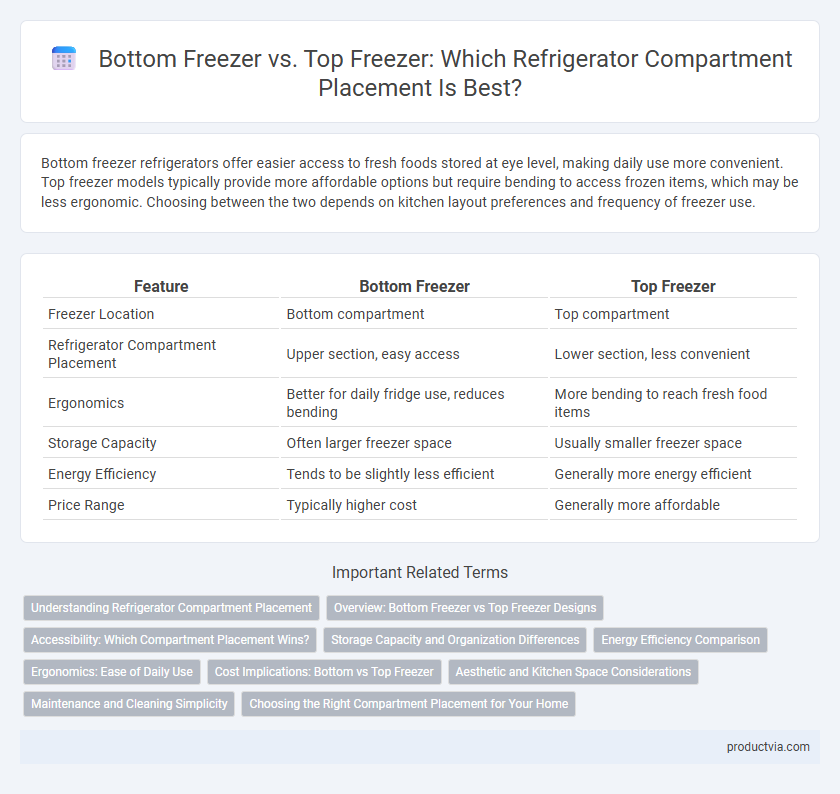Bottom freezer refrigerators offer easier access to fresh foods stored at eye level, making daily use more convenient. Top freezer models typically provide more affordable options but require bending to access frozen items, which may be less ergonomic. Choosing between the two depends on kitchen layout preferences and frequency of freezer use.
Table of Comparison
| Feature | Bottom Freezer | Top Freezer |
|---|---|---|
| Freezer Location | Bottom compartment | Top compartment |
| Refrigerator Compartment Placement | Upper section, easy access | Lower section, less convenient |
| Ergonomics | Better for daily fridge use, reduces bending | More bending to reach fresh food items |
| Storage Capacity | Often larger freezer space | Usually smaller freezer space |
| Energy Efficiency | Tends to be slightly less efficient | Generally more energy efficient |
| Price Range | Typically higher cost | Generally more affordable |
Understanding Refrigerator Compartment Placement
Bottom freezer refrigerators provide easier access to fresh food items stored in the upper refrigerator compartment, enhancing convenience for daily use. Top freezer models are generally more energy-efficient due to the natural rise of cold air, making them cost-effective options for budget-conscious consumers. Choosing between bottom and top freezer placement depends on preferences for accessibility, energy consumption, and user ergonomics.
Overview: Bottom Freezer vs Top Freezer Designs
Bottom freezer refrigerators feature the freezer compartment beneath the fresh food section, enhancing accessibility to frequently used items and promoting organized storage with pull-out drawers. Top freezer models position the freezer above the refrigerator compartment, offering a traditional layout that generally costs less and consumes less energy. The choice between these designs depends on user preferences for convenience, storage capacity, and budget considerations.
Accessibility: Which Compartment Placement Wins?
Bottom freezer refrigerators offer superior accessibility for fresh food storage, as the more frequently used refrigerator compartment is positioned at eye level, reducing the need to bend down frequently. Top freezer models require users to bend or squat to access fresh food, which can be less ergonomic, especially for individuals with mobility issues. Therefore, bottom freezer designs win in terms of accessibility by prioritizing ease of reach for everyday fresh food items.
Storage Capacity and Organization Differences
Bottom freezer refrigerators typically offer more spacious freezer compartments, allowing for better organized storage with pull-out drawers and bins that improve accessibility. Top freezer models often have smaller freezer capacity, limiting storage options and requiring more stacking, which can reduce organization efficiency. Consumers seeking maximum freezer storage and ease of access often prefer bottom freezer designs due to these advantages.
Energy Efficiency Comparison
Bottom freezer refrigerators generally offer better energy efficiency due to improved cold air circulation and reduced compressor workload, as cold air naturally sinks to the lower compartments. Top freezer models often consume slightly more energy because the compressor must work harder to maintain consistent cooling across both compartments. Choosing a bottom freezer design can lead to lower electricity bills while maintaining optimal food preservation.
Ergonomics: Ease of Daily Use
Bottom freezer refrigerators offer enhanced ergonomics by placing fresh food compartments at eye level, reducing the need to bend frequently during daily use. Top freezer models require more bending to access fresh items, which can cause discomfort over time. Users prioritizing ease of access and frequent use often prefer bottom freezer configurations for improved convenience and reduced strain.
Cost Implications: Bottom vs Top Freezer
Bottom freezer refrigerators typically have higher upfront costs due to their advanced design and convenient access to fresh food compartments, making them popular in modern kitchens. Top freezer models tend to be more budget-friendly, offering a lower purchase price and generally reduced repair expenses, which appeals to cost-conscious consumers. Energy consumption can also affect long-term costs, with top freezer units often being more energy-efficient compared to bottom freezer models.
Aesthetic and Kitchen Space Considerations
Bottom freezer refrigerators offer a modern, sleek design that enhances kitchen aesthetics by keeping the fresh food compartment at eye level, creating a streamlined appearance. Their layout maximizes kitchen space by reducing the need to bend for frequently accessed items, improving ergonomic efficiency and workflow. Top freezer models, while traditionally more compact and space-saving, may disrupt kitchen visual flow and require more bending, affecting both style and functional space utilization.
Maintenance and Cleaning Simplicity
Bottom freezer refrigerators often offer easier access to the refrigerator compartment, making regular cleaning and maintenance more convenient due to reduced bending. Top freezer models can complicate cleaning tasks since the refrigerator section is positioned lower, requiring more effort to reach and maintain. The design of bottom freezers typically allows better organization, minimizing spills and messes, which further simplifies upkeep.
Choosing the Right Compartment Placement for Your Home
Bottom freezer refrigerators offer easier access to fresh food items since the refrigerator compartment is at eye level, making meal prep and daily use more convenient. Top freezer models generally provide more affordable options and better energy efficiency but require bending to reach frozen goods. Choosing the right compartment placement depends on your kitchen layout, user habits, and whether easy access to fresh or frozen items is a priority.
Bottom freezer vs top freezer for refrigerator compartment placement Infographic

 productvia.com
productvia.com